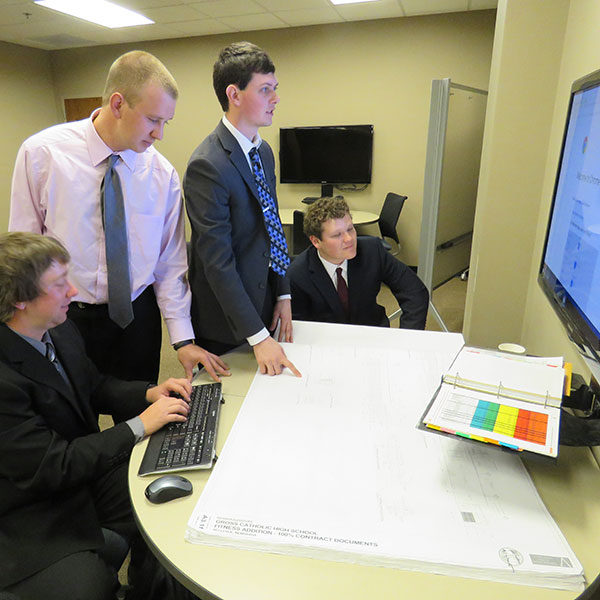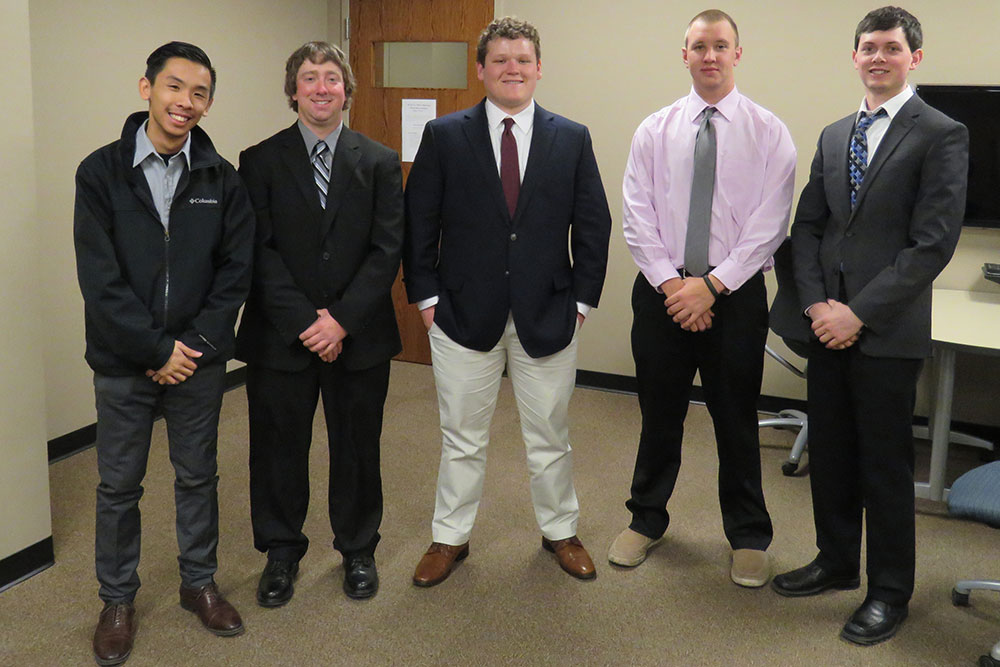Calendar Icon
Apr 27, 2017
Person Bust Icon
By Karl Vogel
![]() RSS
Submit a Story
RSS
Submit a Story

Most of the departments in the University of Nebraska-Lincoln College of Engineering offer multi-semester programs for their senior design capstone experience.
Some, however, like the construction management teams in The Durham School of Architectural Engineering and Construction, have their final project condensed into a single semester.
Bob Bloechle, a project manager at Hawkins Construction who teaches the course on the City (Lincoln) Campus, said the construction management capstone is structured with a purpose.
"The importance is that we are trying to give them an experience that is as much real-life as possible so that when they go to work they become productive on Day One for the employer," Bloechle said.
This semester, there are seven teams in Bloechle's class and all are expected to operate as a firm that is bidding on a major construction project. This year's project is the construction of a fitness center for an Omaha high school, a project that Hawkins completed in real life.
After being assigned to teams, the semester begins with students creating their own company and assigning duties within the team structure.
One of the Bloechle's teams, however, is taking a unique approach to the team dynamic and is finding a bit of success. The five-person "company" of Devron Crawford, Kyle Hohenstein, Sang Lam, Alix Meisinger and Kelton Terry assigned job titles according to course requirements, but took on a more collaborative than delegated structure.
"Other teams have split off parts of the project packet we're given – one guy does this, another guy does that. We've been meeting and going through everything together. We try to make it so we all know what's going on in all phases of the project," Crawford said.
The result, Terry said, has been surprisingly efficient.
"With everyone working on all phases, you'd think that we'd be stepping all over each other," Terry said. "It's going faster and it's easier because we all understand the entire project. When we're asked a question in a meeting or presentation, more than one person can respond. And when we need to meet a deadline, we've been ahead of schedule most of the time."
The teamwork was especially important the first two weeks of the semester, as the team had to prepare a statement of qualification, which outlines for the client the reasons the company is qualified to take on the construction project.
At the deadline the team was expected to turn in a three-ring binder with it's qualifications. Terry said his team's binder was 180 pages full of information from qualifications to contracts and checklists.
Meisinger called said those two weeks were the toughest of the entire semester.
"From Day One you realize, 'wow, this is going to be a lot of work,' " Meisinger said. "We met nearly every day, and every time we met was at least three hours of work in the lab. We got things done, but it was always a constant guessing game – 'Did we cover everything? Did we do it right?' There's always something you have to be thinking about."
From there, the teams take on the scheduling of labor and estimating of costs needed to complete the project. It was in this scenario that students had to rely on the classes they had taken in their construction management program.
For the first time, though the students had to generate all the information from scratch and had to deal with curveballs thrown by the client – or in this case by Bloechle, who informed the students that a cooling tower would be required.
"Bob said during the class that he wasn't going to hold our hands through the process," Crawford said. "And he didn't."
"It's almost a second language that we're all learning, a path that a construction project takes," Meisinger said. "You know your five steps – you do concrete work first, steel, framing, interior and then finishes. You just break it down from there."
After scheduling and estimating the project, the teams prepare for their version of the mid-term exam – Bid Day – on March 10.
That's when the teams all assemble in the classroom and over three and a half ours, Bloechle announces bids that are from fictitious subcontractors and suppliers. Teams have until the end of the class to assess and analyze the information, complete a project bid and submit it.
"You have to prepare for the day. You get so many different numbers and so many options," Hohenstein said. "Two bids might have the same price, but one company might be leaving something out of their scope. It's stressful because you can't really finger through every letter, you have to rely on your gut on some of them."
In addition, Terry said, some of the previous bids were changed during the class, causing teams to reassess their decisions.
"Bob would give us 'ring-rings', which are telephone calls that he would announce to the class," Terry said. "An electrical contractor started out with a price of $320,000 and lowered its bid three or four times. He started out expensive and ended up as the low."
Crawford said that was what caused teams to struggle.
"It was where our organization fell apart," Crawford said. "That got chaotic for us and it was like that for everyone."
"That's what we do every day in construction," Bloechle said. "It forces them to make decisions. If you have a bidder that is very high and the next bidder is very low, there's a spread of 10 or 15 percent in their bids or a sub-bidder, which one do you use?"
With 12 seconds remaining in the class, Crawford's team submitted a project bid of $2.47 million. It was the second team to finish, and only two more submitted bids before the deadline. Three teams did not finish.
"We felt pretty comfortable with our bid," Crawford said. "But it was stressful. You're hoping you've covered everything, but you just don't know."
For the second half of the semester, the teams work as if they've won the project and process contract proposal requests, adjust schedules and estimates and fill out more documents and work to put together their final packets, which were due April 21. Final presentations will be given the following week, with all teams presenting during class, where they explain their bid and try to convince the client for the last time.
Meisinger said the capstone project helped him reaffirm his career goals.
"I had this idea that I was going to be a project super, and this project has wholeheartedly supported that," Meisinger said. "I don't want to do the bid. I don't want to do the guessing game. I'd rather be the problem solver in the field."
At semester's end, Bloechle said, the students should be prepared for careers in construction management. However, they will still have plenty to learn on the job.
"If you're paying a person and they're not producing, where does that money go? Right to the bottom line," Bloechle said. "That efficiency and that understanding of productivity is so critical.
"We're bringing together what they've learned about equipment, production, estimating, scheduling and safety. That gives them the tools to build a good career. Now, they have to go out there and do it."
Submit a Story
